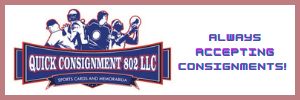
Upper Deck President Allegedly Drunk in Deposition
I have a few pieces of advice I tell my witnesses before the other side takes their depositions:
- Don't get combative with the other side's attorney.
- Don't be evasive.
- You can't win a case in a deposition, but you sure can lose one.
This is common advice that most seasoned attorneys worth their hourly rate will tell their witnesses. Unfortunately, Richard McWilliam, president of Upper Deck, missed this legal memo. According to Law360 (subscription required), Richard McWilliam allegedly showed up to his deposition in the Kareem Abdul-Jabbar v. Upper Deck action drunk. Regardless, from a review of the transcript, it was an awkward deposition, mostly because McWilliam didn't heed the above advice.
First, you don't want to seem combative in a deposition because lawyers make their living off of sound bites. If for five seconds of a seven-hour deposition, the other side's attorney makes you seem like a jerk, that's priceless. Why? Because that five second excerpt will likely be shown to the jury. And if the jury thinks you are jerk, they're likely not going to listen to you.
Unfortunately, Mr. McWilliam was somewhat combative in his deposition. Here are some highlights from the transcripts.
Abdul-Jabbar's Attorney: Well, sir. You don't get to ask me questions in the deposition. I get to ask you questions. So the question--
McWilliam: Oh, you get to do whatever you want to do?
JA: The question is, did you bring any of those documents with you today?
Mc: Do you get to answer--you get to question anything you want to do?
and
JA: Okay. So you don't--you--well, let me ask you this. What's your position right now? What do you do?
Mc: I wake up.
JA: Do you work for anybody?
Mc: No.
JA: What's your--do you have any position with The Upper Deck Company?
Mc: Yeah, when I wake up.
JA: What do you do with The Upper Deck Company?
Mc: I go to work.
JA: Okay. And do you--are you the president of the company?
Mc: Yes. Sometimes he is.
JA: Are you referring to Mr. Bernstein?
Mc: Um-hum.
JA: So sometimes you're the president of the company and sometimes Mr. Bernstein is the president of the company?
Mc: Calls me up and he gets mad at me.
Yikes. The deposition would have looked a lot better if it went this way:
Q. Did you bring any of those documents with you today?
A. No.
and
Q. What's your position right now?
A. I'm the president of the Upper Deck Company.
I think you'll agree, just answering the questions looks a lot better on paper. It sounds even better to a jury.
The second piece of advice is to not be evasive. Jurors hate people who aren't entirely truthful. When witnesses get caught waffling, avoiding questions or hiding the truth, jurors will likely discredit everything else in that witness' testimony, even if it is true. Also, when two witnesses contradict each other, jurors will likely discredit the person who seems to be playing games.
Here, at the beginning of his deposition, McWilliam testified that he was not under the influence of drugs or alcohol during the deposition. Jabbar's attorney filed a declaration, also under penalty of perjury, where he contradicts McWilliam. Here's what Abdul-Jabbar's attorney said:
McWilliam was visibly under the influence of drugs and/or alcohol. McWilliam staggered into the deposition room, had an appearance that looked flush, slurred throughout his deposition, and made incoherent and nonsensical statements during the deposition.
If it turns out that McWilliam was less than forthcoming about whether he was drunk during his deposition, that could really hurt his case. Also, given McWilliam was also combative, he may already have had a strike against him in the juror's mind.
Which leads us to the last piece of advice: you can't win a case in a deposition, but you can sure lose one. Normally, depositions are run by the other side's attorneys. Likely, those attorneys have conducted hundreds of depositions and know how to get what they want. They are experts. On the other side, most people are not experts in being deposed. As you can see, it’s the lawyers’ game. They're going to score points on the witness no matter what. The best a witness can hope for is to reduce the damage.
This deposition underscores the importance of my last bit of advice. McWilliam's attorney prematurely ended the deposition (citing health reasons for McWilliam), which caused Abdul-Jabbar's attorney to ask the court for sanctions against McWilliam. While there, the judge threatened to enter a default judgment against the defendants.
Legal translation: The judge was probably about four seconds away from giving the win to Abdul-Jabbar.
Instead of ruling the case in Abdul-Jabbar's favor, the judge ordered a do-over deposition for McWilliam for today. The judge also postponed the trial for two weeks. He also warned if McWilliam does not cooperate, he may have to rule in Abdul-Jabbar's favor on everything.
So, McWilliam (and Upper Deck) may have dodged a bullet. They could have lost the case right there. Still, I think this deposition is damaging and will affect the rest of the trial. Heck, if I was the plaintiff's attorney, it would be the centerpiece of my opening statement.
Worse for Upper Deck, the fallout from this deposition will extend beyond this case. Given the sheer number of other Upper Deck cases out there, I imagine that all the attorneys on the other side are drafting their own deposition notices for McWilliam, hoping for a repeat performance.
Click here for a copy of the full deposition.
The information provided in Paul Lesko's "Law of Cards" column is not intended to be legal advice, but merely conveys general information related to legal issues commonly encountered in the sports industry. This information is not intended to create any legal relationship between Paul Lesko, the Simmons Browder Gianaris Angelides & Barnerd LLC or any attorney and the user. Neither the transmission nor receipt of these website materials will create an attorney-client relationship between the author and the readers.
The views expressed in the "Law of Cards" column are solely those of the author and are not affiliated with the Simmons Law Firm. You should not act or rely on any information in the "Law of Cards" column without seeking the advice of an attorney. The determination of whether you need legal services and your choice of a lawyer are very important matters that should not be based on websites or advertisements.
 | Making purchases through affiliate links can earn the site a commission |

































Jeff
Wow i’m speechless.